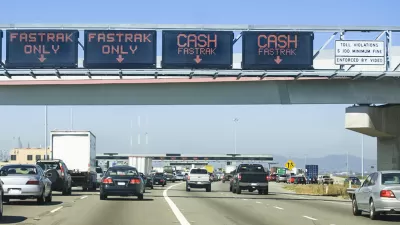In this special "Energy: Squaring Off" section, experts take opposing sides on six energy issues - the first being how best to pay for transportation. Carl Davis of the Institute on Taxation and Economic Policy vs. Robert Poole of Reason Foundation.
The Wall Street Journal introduces the topic with the dubious assertion that "(t)he federal gasoline tax is broken". As Carl Davis, senior policy analyst at the Institute on Taxation and Economic Policy (ITEP), writes,
Despite decades of neglect, the gasoline tax remains the single most important source of transportation funding in this country, and for good reason: With the tax, people who drive the most or own the heaviest and least fuel-efficient vehicles tend to pay more during their frequent stops at the gas station.
Clearly what's broken is the will to raise it, not the tax itself. But considering the paralysis in federal government due to party polarization, e.g. the inability to tackle the sequester, should we really expect Congress to agree on raising a gas tax?
Davis' solution is to adjust the gas tax to inflation - though he doesn't state speciifically how, "coupled with an immediate gasoline-tax increase to catch up with the past 20 years of inflation, would put transportation revenue on a much more sustainable path."
ITEP published a related report in December, 2011, "Building a Better Gas Tax - A New 50-State Report" summarized here that includes quotes from Mr. Davis.
Robert Poole, director of transportation policy at the Reason Foundation does believe the federal gas tax is broken. He writes that "(l)obbying for a higher federal gasoline tax is a waste of effort."
Drivers, many of whom are already unhappy with the price of gasoline, aren't going to go for it because they don't believe the extra revenue would be used on projects that actually improve their daily travel.
Poole's solution is to "push for replacing fuel taxes with road user fees based on miles traveled rather than gallons consumed." Why?
The fairest way to charge for using highway space is a per-mile fee [also referred to as a 'vehicle-miles-traveled (VMT) fee], with significantly higher rates for heavy vehicles (which cause most road damage) and with variable rates on highways prone to congestion.
What's more, Poole thinks that we can transition to the VMT fee immediately "using existing low-cost all-electronic tolling (transponders and license-plate imaging) on all limited-access highways, such as Interstates and expressways."
Of course - this topic has been well-researched and is also confronting states. Two federally authorized commissions came to a similar conclusion - it's not one or the other but both that are needed, that is, immediately raise the gas tax while begin transitioning to a VMT fee.
FULL STORY: Is Raising the Federal Gasoline Tax the Best Way to Pay for Highways?

Alabama: Trump Terminates Settlements for Black Communities Harmed By Raw Sewage
Trump deemed the landmark civil rights agreement “illegal DEI and environmental justice policy.”

Study: Maui’s Plan to Convert Vacation Rentals to Long-Term Housing Could Cause Nearly $1 Billion Economic Loss
The plan would reduce visitor accommodation by 25% resulting in 1,900 jobs lost.

Planetizen Federal Action Tracker
A weekly monitor of how Trump’s orders and actions are impacting planners and planning in America.

Waymo Gets Permission to Map SF’s Market Street
If allowed to operate on the traffic-restricted street, Waymo’s autonomous taxis would have a leg up over ride-hailing competitors — and counter the city’s efforts to grow bike and pedestrian on the thoroughfare.

Parklet Symposium Highlights the Success of Shared Spaces
Parklets got a boost during the Covid-19 pandemic, when the concept was translated to outdoor dining programs that offered restaurants a lifeline during the shutdown.

Federal Homelessness Agency Places Entire Staff on Leave
The U.S. Interagency Council on Homelessness is the only federal agency dedicated to preventing and ending homelessness.
Urban Design for Planners 1: Software Tools
This six-course series explores essential urban design concepts using open source software and equips planners with the tools they need to participate fully in the urban design process.
Planning for Universal Design
Learn the tools for implementing Universal Design in planning regulations.
Caltrans
Smith Gee Studio
Institute for Housing and Urban Development Studies (IHS)
City of Grandview
Harvard GSD Executive Education
Toledo-Lucas County Plan Commissions
Salt Lake City
NYU Wagner Graduate School of Public Service



























